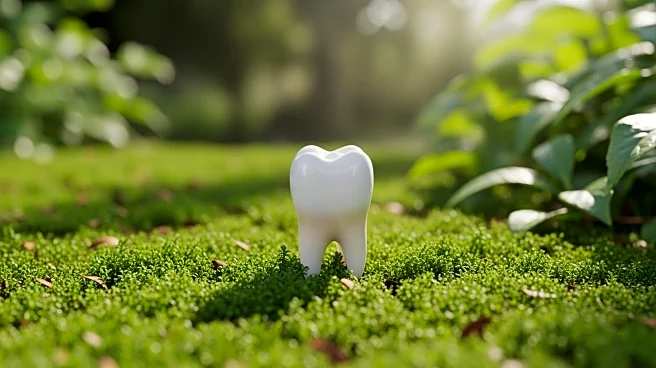What's Happening?
Japanese researchers have developed a drug that could potentially help people grow new teeth, according to multiple peer-reviewed journals. The drug works by reactivating extra 'tooth buds' present in most
people's mouths, a process initially proven effective in mice. The drug targets a protein known as uterine sensitization-associated gene-1 (Usag-1), which prevents the growth of new teeth. By inhibiting this protein, researchers have successfully promoted tooth development in mice, suggesting potential future applications for humans with congenital tooth agenesis. The research has been published in journals such as Scientific Reports and Regenerative Therapy, highlighting advancements in tooth regeneration and the possibility of a 'third dentition' or a third set of teeth.
Why It's Important?
The development of a drug capable of regrowing teeth could revolutionize dental care, potentially eliminating the need for dentures and implants. This advancement holds significant implications for individuals suffering from congenital tooth agenesis, a condition where teeth never develop. If successful in human trials, the drug could offer a permanent solution to tooth loss, improving quality of life and reducing healthcare costs associated with dental prosthetics. The research also opens new avenues in regenerative medicine, showcasing the potential for targeted molecular therapy to address developmental deficiencies.
What's Next?
Clinical trials on humans are being conducted by Toregem BioPharma, a company co-founded by Katsu Takahashi, an associate professor at Kyoto University and contributor to the research. The trials aim to validate the drug's effectiveness in humans and explore its potential applications. The success of these trials could lead to widespread adoption of the drug in dental practices, transforming the approach to treating tooth loss and related conditions.
Beyond the Headlines
The ethical implications of tooth regeneration are significant, as it challenges traditional dental practices and raises questions about accessibility and cost. The potential for a third set of teeth also prompts discussions on genetic manipulation and its long-term effects on human health. As the research progresses, it will be crucial to address these concerns and ensure equitable access to the benefits of this medical advancement.









